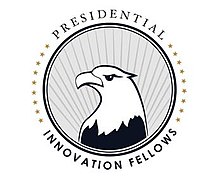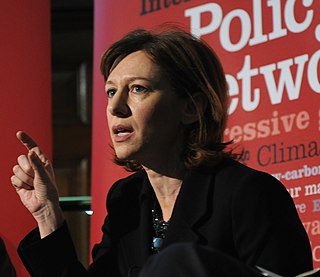
Karen Kornbluh served as U.S. Ambassador to the OECD under President Barack Obama and as a senior official at the U.S. Department of the Treasury and Federal Communications Commission under President Bill Clinton. She is an expert on communications policy, international trade and issues affecting working families. Her profile in The New York Times focused on her efforts “Fighting for Economic Equality.” She is now Director of the Digital Innovation and Democracy Initiative at the German Marshall Fund of the United States, a think tank dedicated to promoting transatlantic cooperation, where she is also a Senior Fellow. She also currently serves as the Chairperson of the board of the Open Technology Fund. She was previously Executive Vice President of External Affairs at Nielsen, Senior Fellow for Digital Policy at the Council on Foreign Relations, and a presidentially-appointed member of the Broadcasting Board of Governors. She was a senior adviser to Barack Obama from the beginning of his Senate tenure throughout his 2008 presidential campaign.

Vivek Kundra is a former American administrator who served as the first chief information officer of the United States from March, 2009 to August, 2011 under President Barack Obama. He is currently the chief operating officer at Sprinklr, a provider of enterprise customer experience management software based in NYC. He was previously a visiting Fellow at Harvard University.
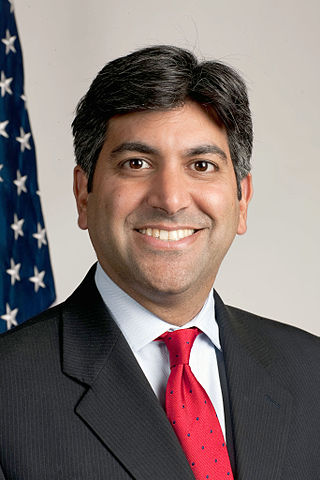
Aneesh Paul Chopra is an American executive who served as the first Chief Technology Officer of the United States. He was appointed in 2009 by President Barack Obama and was at the White House through 2012. Chopra previously served as Virginia's Secretary of Technology under Governor Tim Kaine. Chopra was a candidate in 2013 for the Democratic nomination for Lieutenant Governor of Virginia. He is the author of Innovative State: How New Technologies Can Transform Government (2014) and co-founder and president of CareJourney. In 2015 he joined Albright Stonebridge Group as a senior advisor.
The United States Chief Technology Officer is an official in the Office of Science and Technology Policy. The U.S. CTO helps the President and their team harness the power of data, innovation and technology on behalf of the American people. The CTO works closely with others both across and outside government on a broad range of work including utilizing technology to improve the government and its services, while supporting national interests through the promotion of technological innovation. Specifically, the CTO uses applied technology to help create jobs, create paths to improve government services with lower costs, higher quality and increased transparency, help upgrade agencies to use open data and expand their data science capabilities, improve quality and reduce the costs of health care and criminal justice, increase access to broadband, bring technical talent into government for policy and modern operations input, improve community innovation engagement by agencies working on local challenges, and help keep the nation secure.

The federal Chief Information Officer of the United States, also known as the United States Chief Information Officer, is the administrator of the Office of Electronic Government, or the Office of the Federal CIO (OFCIO), which is part of the Office of Management and Budget. The President appoints the Federal CIO. The appointee does not require Senate confirmation. It was created by the E-Government Act of 2002.
The Office of Social Innovation and Civic Participation was an office new to the Obama Administration, created within the White House, to catalyze new and innovative ways of encouraging government to do business differently. Its first director was the economist Sonal Shah. The final director was David Wilkinson.
The National Strategy for Trusted Identities in Cyberspace (NSTIC) is a US government initiative announced in April 2011 to improve the privacy, security and convenience of sensitive online transactions through collaborative efforts with the private sector, advocacy groups, government agencies, and other organizations.

Todd Park is a Korean American entrepreneur and government executive. He served as Chief Technology Officer of the United States and technology advisor for U.S. President Barack Obama.

Megan J. Smith is an American engineer and technologist. She was the third Chief Technology Officer of the United States and Assistant to the President, serving under President Barack Obama. She was previously a vice president at Google, leading new business development and early-stage partnerships across Google's global engineering and product teams at Google for nine years, was general manager of Google.org, a vice president briefly at Google[x] where she co-created WomenTechmakers, is the former CEO of Planet Out and worked as an engineer on early smartphones at General Magic. She serves on the boards of MIT and Vital Voices, was a member of the USAID Advisory Committee on Voluntary Aid and co-founded the Malala Fund. Today Smith is the CEO and Founder of shift7. On September 4, 2014, she was named as the third U.S. CTO, succeeding Todd Park, and serving until January, 2017.
Government crowdsourcing is a form of crowdsourcing employed by governments to better leverage their constituents' collective knowledge and experience. It has tended to take the form of public feedback, project development, or petitions in the past, but has grown to include public drafting of bills and constitutions, among other things. This form of public involvement in the governing process differs from older systems of popular action, from town halls to referendums, in that it is primarily conducted online or through a similar IT medium.

Kathy "Coach" Kemper is an American executive, tennis coach, writer, and philanthropist. Kemper rose to prominence in the tennis scene, eventually heading the women's tennis team at Georgetown University, where she earned the nickname "Coach". Kemper has spent more than 30 years coaching movie stars, professional athletes, monarchs, Supreme Court Justices, Ambassadors, members of Congress, intelligence agency directors, and individuals from seven White House administrations.

18F is a digital services agency within the Technology Transformation Services department of the General Services Administration (GSA) of the United States Government. Their purpose is to deliver digital services and technology products.
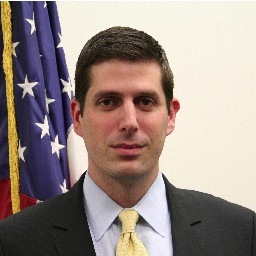
Nick Sinai is a venture capitalist, adjunct faculty at Harvard Kennedy School, author, and a former senior official in the Obama Administration.

LaVerne H. Council, MBA, DBA was the Assistant Secretary for Information and Technology and Chief Information Officer for the Office of Information and Technology within the U.S. Department of Veterans Affairs. Council assumed this role in July 2015. President Obama nominated Council to the role in March 2015. Council was confirmed by the 114th Congress on June 23, 2015, making Council the first female CIO of a Cabinet-level federal agency. She managed a $4.2B Information Technology (IT) appropriation, the first centralized and only IT appropriation in the federal government.

The Institute For Education, known as IFE, is a U.S. 501(c)(3) nonprofit organization headquartered in Washington, DC. The organization facilitates bipartisan collaboration by convening and networking high level leaders from the bounds of politics, business, media, academia, and more. A selection of guests hosted by the Institute include Hillary Rodham Clinton, John McCain, Antonin Scalia, Orrin Hatch, Ruth Bader Ginsburg and Arianna Huffington.
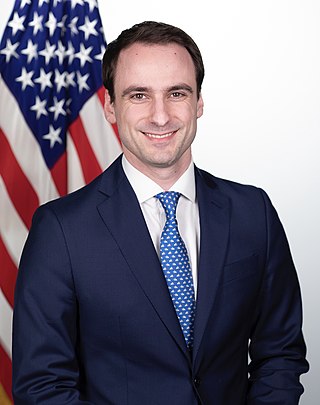
Michael John Kotsakas Kratsios is an American business executive and government official. He served as the fourth Chief Technology Officer of the United States at the White House Office of Science and Technology Policy. In this role, Kratsios served as President Donald Trump's top technology advisor. From July 10, 2020 to January 20, 2021, Kratsios was also the Acting Under Secretary of Defense for Research and Engineering.

Leigh Heyman is the former Director of New Media Technologies for the Obama White House, where he served from 2011 to 2015, and a retired U.S. National Team coxswain.
Erie Meyer is an American technologist and federal government executive. She currently serves as Chief Technologist of the Consumer Financial Protection Bureau (CFPB) and previously served as Chief Technologist of the Federal Trade Commission (FTC) under FTC Chair Lina Khan in 2021. Meyer had also served as a technologist in the office of then-FTC Commissioner Rohit Chopra. Meyer is the co-founder of the networking list Tech Ladymafia with Aminatou Sow. In 2022, she was named a Tech Titan by Washingtonian magazine.

Cristin Ann Dorgelo is the senior advisor for management at the White House Office of Management and Budget. Dorgelo is the president emeritus of the Association of Science and Technology Centers, where she previously served as president and CEO. Dorgelo served as the chief of staff at the Office of Science and Technology Policy during the Barack Obama White House.

